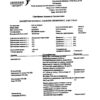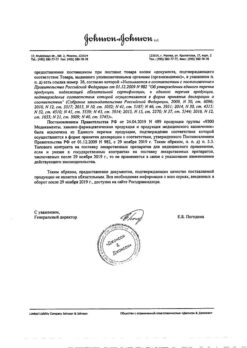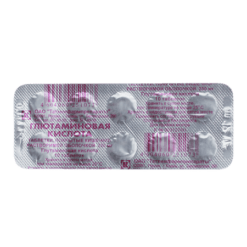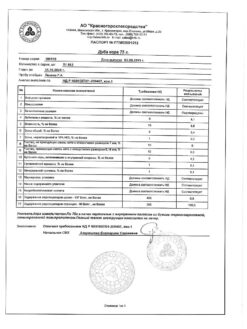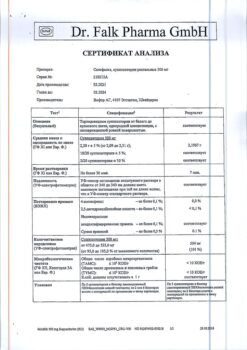No products in the cart.
Imodium Express, 2 mg 6 pcs
€5.17 €4.00
Description
Acute and chronic diarrhea (diarrhea); stool regulation in patients with ileostomies
Indications
Indications
Acute and chronic diarrhea (diarrhea); regulation of stool in patients with ileostomy
Special instructions
Special instructions
Treatment of diarrhea with Imodium® is symptomatic only. In cases where it is possible to establish the cause of diarrhea, appropriate therapy should be carried out.
In patients with diarrhea, especially children, loss of fluid and electrolytes may occur. In such cases, it is necessary to carry out appropriate replacement therapy (replenishment of fluid and electrolytes). And
Modium® lyophilized tablets contain a source of phenylalanine. Use by patients with phenylketonuria is contraindicated.
If there is no effect after 2 days of treatment, it is necessary to stop taking the drug, clarify the diagnosis and exclude infectious genesis
diarrhea. AIDS patients taking Imodium® for the treatment of diarrhea should stop taking the drug at the first sign of abdominal bloating. There have been isolated reports of constipation with an increased risk of developing toxic megacolon in patients with AIDS and infectious colitis of viral and bacterial etiology who were treated with loperamide.
Although there are no data on the pharmacokinetics of loperamide in patients with hepatic impairment, Imodium should be used with caution in such patients due to slow first-pass metabolism, as this can lead to relative overdose and toxic damage to the central nervous system.
If the medicine has become unusable or has expired, do not throw it into wastewater or onto the street! Place the medication in a bag and place it in the trash. These measures will help protect the environment!
Active ingredient
Active ingredient
Loperamide
Composition
Composition
1 tablet contains:
Active substance:
loperamide hydrochloride 2 mg;
Excipients:
gelatin – 5.863 mg,
mannitol – 4.397 mg,
aspartame – 0.75 mg,
mint flavor – 0.3 mg,
sodium bicarbonate – 0.375 mg,
purified water 136.315 mg (removed during lyophilization).
Pregnancy
Pregnancy
Use during pregnancy
There is no evidence that loperamide is teratogenic or embryotoxic.
During the first trimester of pregnancy, taking Imodium® Express is contraindicated.
During the II-III trimesters of pregnancy, the use of Imodium® Express is possible only after consultation with your doctor. The drug can be
Use during breastfeeding
Small amounts of loperamide may pass into breast milk, therefore Imodium® Express is not recommended for use during breastfeeding.
Contraindications
Contraindications
– acute dysentery and other gastrointestinal infections (caused, including Salmonella spp., Shigella spp., Campylobacter spp.);
— intestinal obstruction (including, if necessary, avoiding suppression of peristalsis);
— diverticulosis;
– acute ulcerative colitis;
— pseudomembranous enterocolitis (diarrhea caused by taking antibiotics);
— I trimester of pregnancy;
– lactation period (breastfeeding);
– children up to 6 years of age;
– hypersensitivity to loperamide and/or other components of the drug.
Side Effects
Side Effects
Adverse reactions are adverse events for which a causal relationship with the use of loperamide should be considered proven based on a comprehensive assessment of available information about the adverse event.
In some cases, it is quite difficult to reliably establish a cause-and-effect relationship between taking loperamide and the occurrence of these symptoms.
In addition, because clinical studies are conducted in different settings, the incidence of adverse reactions in clinical trials of one drug cannot be directly compared with the incidence of adverse reactions in clinical trials of another drug and may not be representative of the incidence of adverse reactions in clinical practice.
According to clinical studies, adverse reactions observed in ≥1% of patients taking Imodium® for acute diarrhea: headache, constipation, flatulence, nausea, vomiting.
Adverse reactions observed in <1% of patients taking Imodium® for acute diarrhea: drowsiness, dizziness, headache, dry mouth, abdominal pain, nausea, vomiting, constipation, discomfort and bloating, upper abdominal pain, rash.Adverse reactions observed in ≥1% of patients taking Imodium® for chronic diarrhea: dizziness, flatulence, constipation, nausea.Adverse reactions observed in <1% of patients taking Imodium® for chronic diarrhea: headache, abdominal pain, dry mouth, abdominal discomfort, dyspepsia.
Interaction
Interaction
According to preclinical studies, loperamide is a substrate of P-glycoprotein.
With the simultaneous use of loperamide (single dose of 16 mg) and quinidine or ritonavir, which are P-glycoprotein inhibitors, the concentration of loperamide in the blood plasma increased by 2-3 times.
The clinical significance of the described pharmacokinetic interaction with P-glycoprotein inhibitors when using loperamide at recommended doses is unknown.
The simultaneous use of loperamide (single dose of 4 mg) and itraconazole, an inhibitor of the CYP3A4 isoenzyme and P-glycoprotein, led to an increase in the concentration of loperamide in the blood plasma by 3-4 times.
In the same study, the use of the CYP2C8 isoenzyme inhibitor, gemfibrozil, led to an approximately 2-fold increase in plasma concentrations of loperamide.
When using a combination of itraconazole and gemfibrozil, the peak plasma concentration of loperamide increased by 4 times and the total concentration by 13 times. This increase was not associated with CNS effects as assessed by psychomotor tests (i.e., subjective sleepiness rating and digit substitution test).
The simultaneous use of loperamide (single dose of 16 mg) and ketoconazole, an inhibitor of CYP3A4 and P-glycoprotein, led to a fivefold increase in the concentration of loperamide in the blood plasma. This increase was not associated with an increase in pharmacodynamic effect assessed by pupil size.
With simultaneous oral administration of desmopressin, the concentration of desmopressin in the blood plasma increased 3-fold, probably due to a slowdown in gastrointestinal motility.
It is expected that drugs with similar pharmacological properties may increase the effect of loperamide, and drugs that increase the rate of passage through the gastrointestinal tract may decrease the effect of loperamide.
Overdose
Overdose
Symptoms.
In case of overdose (including relative overdose due to impaired liver function), urinary retention, paralytic intestinal obstruction, and signs of central nervous system (CNS) depression may occur: stupor, incoordination, drowsiness, miosis, muscle hypertonicity, respiratory depression.
Children may be more sensitive to the CNS effects of loperamide than adults.
Therapy.
If symptoms of overdose occur, naloxone can be used as an antidote. Because the duration of action of loperamide is longer than that of naloxone (1-3 hours), repeated administration of naloxone may be necessary. Therefore, it is necessary to carefully monitor the patient’s condition for at least 48 hours in order to promptly detect signs of possible CNS depression.
Clinical pharmacology
Clinical pharmacology
Pharmacodynamics:
Loperamide, by binding to opioid receptors in the intestinal wall, inhibits the release of acetylcholine and prostaglandins, thereby slowing down peristalsis and increasing the transit time of contents through the intestines. Increases the tone of the anal sphincter, thereby reducing fecal incontinence and the urge to defecate.
As a result of a clinical study, data were obtained that the antidiarrheal effect occurs within one hour after taking a single dose (4 mg).
Pharmacokinetics:
Most of loperamide is absorbed in the intestine, but due to active first-pass metabolism, systemic bioavailability is approximately 0.3%.
Data from preclinical studies indicate that loperamide is a substrate of P-glycoprotein. The binding of loperamide to plasma proteins (mainly albumin) is 95%.
Loperamide is predominantly metabolized in the liver, conjugated and excreted in bile.
Oxidative N-demethylation is the main route of metabolism of loperamide and is carried out mainly with the participation of an inhibitor of the CYP3A4 and CYP2C8 isoenzymes.
Due to active first-pass metabolism, the concentration of unchanged loperamide in the blood plasma is negligible.
In humans, the half-life of loperamide averages 11 hours, ranging from 9 to 14 hours. Unchanged loperamide and its metabolites are excreted primarily in the feces.
Pharmacokinetic studies have not been conducted in children. The pharmacokinetics of loperamide and its interactions with other drugs are expected to be similar to those in adults.
Short product description
Short product description
The world’s #1 brand to stop diarrhea.
Storage conditions
Storage conditions
Store at a temperature of 15 to 30 °C.
Keep out of the reach of children.
Manufacturer
Manufacturer
Catalent UK Swindon Zaydis Limited, UK
Additional information
| Conditions of storage | Store at temperatures from 15 to 30 ° C. Keep out of reach of children. |
|---|---|
| Manufacturer | Catalent UK Swindon Zydis Limited /Janssen-Silag, UK |
| Medication form | lyophilizate tablets |
| Brand | Catalent UK Swindon Zydis Limited /Janssen-Silag |
Other forms…
Related products
Buy Imodium Express, 2 mg 6 pcs with delivery to USA, UK, Europe and over 120 other countries.







